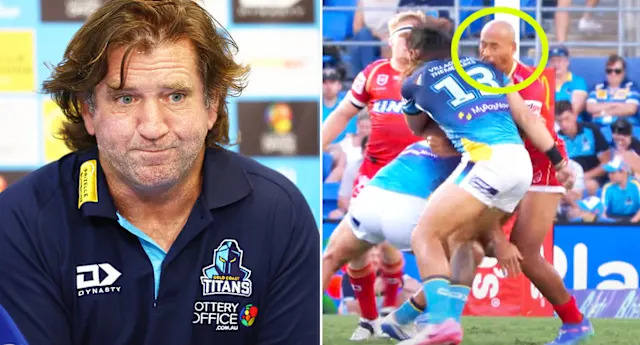
Hasler voiced his displeasure with the issue in the aftermath of his team’s defeat.
Des Hasler and many NRL fans may continue to vent their frustration over the wave of sin-bins issued in round five, but league officials and referees remain steadfast in their commitment to prioritizing player safety. The NRL’s intensified stance on direct and forceful contact to the head resulted in several players being sin-binned and placed on report during Saturday’s trio of matches. Hasler was clearly unimpressed by the rule adjustment, especially after his Titans were soundly beaten 36-10 by the Dolphins.
Titans skipper Tino Fa’asuamaleaui was the first to be sent to the bin just two minutes into the match following a high tackle on Felise Kaufusi. He was subsequently placed on report and handed a one-game suspension (with an early guilty plea). The bunker determined there had been clear and forceful contact to the head, and under the new directive issued by league officials, the decision to remove him from the field was inevitable.
Dolphins forward Ray Stone also received a sin-bin for a high shot and now faces a similar ban, making it five sin-bins in the opening five games of the round. This comes after NRL CEO Andrew Abdo confirmed a clampdown on dangerous head contact, prompted by several missed incidents the previous week. With growing awareness about the long-term consequences of concussions and the risks tied to CTE, many believe this stricter enforcement is essential.
However, in a passionate, unprovoked outburst before media could pose a single question in his post-match press conference, Hasler argued that the frequent sin-binnings were damaging the game for both players and spectators. While acknowledging that his side was outclassed by the Dolphins and insisting he wasn’t trying to make excuses, the Titans coach emphasized that accidental or unintentional high tackles shouldn’t result in time off the field.
Des Hasler and fans push back against sin-bin surge
“People pay good money to watch a game of footy,” Hasler said. “This head contact rule is starting to affect the essence of the sport. Where’s the intent? It’s just another disruption. It’s not as extreme as Magic Round a couple years back, but it’s definitely frustrating.”
He continued, “They need to consider the player’s intent. In six weeks when State of Origin kicks off, players will still be getting sent to the bin. I’m not using this as a reason for our loss… but it’s unnecessary. This isn’t the first time it’s been said, and it won’t be the last—it’s a physical game.”
Hasler’s remarks received considerable backing from across the NRL community, with many labeling the crackdown as excessive and detrimental to the spectacle of the sport.
He was also left scratching his head after Beau Fermor was penalised for lightly tapping Isaiya Katoa on the head during what Hasler considered a heroic, try-saving effort. “That was a textbook piece of rugby league—coming from the opposite side of the field to stop a certain try,” Hasler argued.
“The ref says it was a tap on the head. There was no malice in it. I just don’t get it. There’s pressure coming from somewhere, and it feels like we’re overreacting. You can tell players to lower their tackle target all you want—but it’s not that simple.”
Hasler’s criticism misses the heart of the NRL’s new policy
Hasler does have a point that not every high tackle warrants a sin-bin. There are situations where a slipping ball-carrier causes unavoidable contact. But focusing on a player’s “intent” misses the core issue. Very few players go into tackles deliberately aiming high, and those who do would be pulled off by referees or coaches.
Ultimately, the responsibility lies with the defender to exercise care during tackles. While unintentional head contact will occur, the decision to send players to the bin or issue suspensions involves careful consideration by the bunker and review committee. The punishments handed down on Sunday suggest Hasler’s stance on intent doesn’t align with the league’s broader objective—to protect players and preserve their long-term health.







